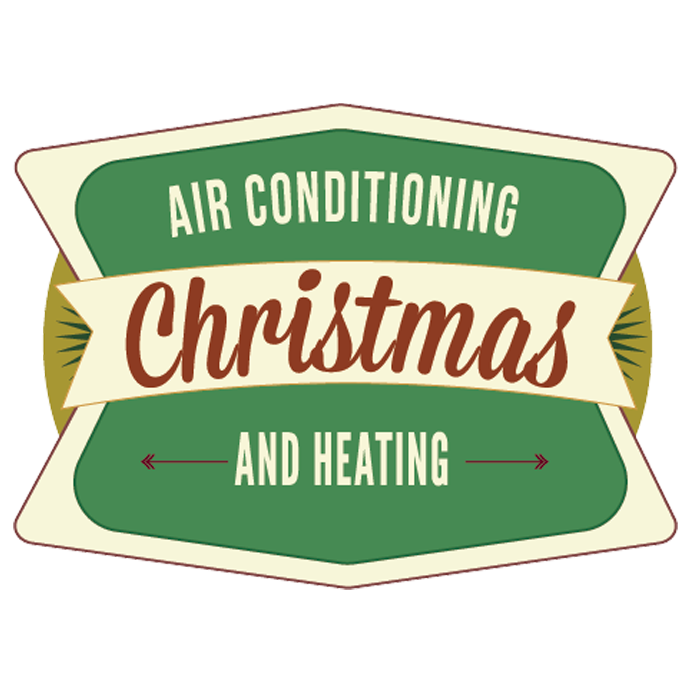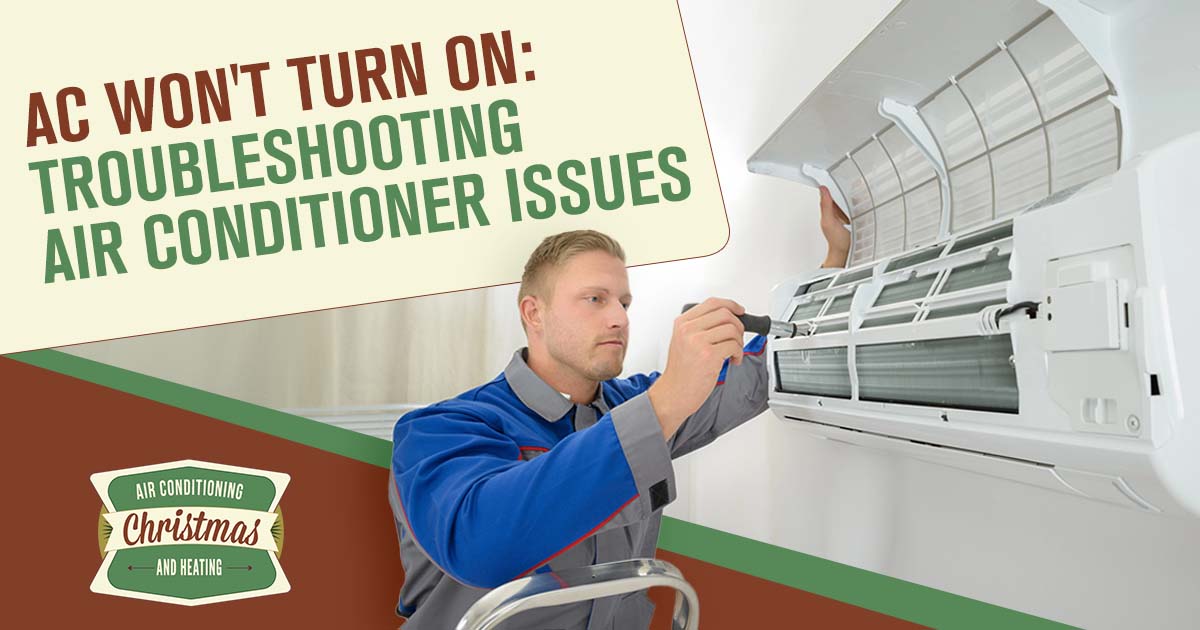It can be frustrating when your air conditioning system isn’t working and doesn’t even turn on, especially during the hottest days. Understanding the common reasons for this problem and how to troubleshoot can save you time and potentially prevent costly repairs. This guide will walk you through the most common issues and offer safe troubleshooting steps to fix your air conditioning and get it running.
Common Reasons Your AC Won’t Turn On & What to Do
There are a handful of reasons why your air conditioner isn’t turning on. Getting to the root of your air conditioning problems is a great first step to getting things back on track to keep your house cool.
Troubleshooting Thermostat Issues
Let’s talk about checking the settings on your thermostat. It’s important to verify it is set to “cool” mode and that the temperature is lower than what it currently is in the room. This might sound simple, but sometimes we forget to adjust the settings and then wonder why the air conditioner does not turn on. This is just a little reminder to always give your thermostat a once-over before getting into the more complicated troubleshooting steps.
It’s also a great idea to check the batteries in the thermostat. Since thermostat batteries are replaced so infrequently, it’s easy to forget to work this step into your routine. Even if the batteries aren’t dead, it’s a good idea to replace them if you haven’t done so in a while. This makes sure your thermostat always has the energy it needs to function properly.
If everything looks great but your room temperature is different than the thermostat setting, then there may be a bigger issue like your AC compressor not turning on.
Troubleshooting Tripped Circuit Breaker
If your air conditioning unit will not turn on, a tripped circuit breaker could be the culprit. To resolve this, locate your home’s electrical panel and inspect the AC circuit breaker. If it has tripped, simply switch it off and then back on to reset it. This straightforward step can often restore power to your air conditioner and get it up and running again.
If the breaker trips repeatedly after you’ve reset it, this could be a sign of a more serious electrical issue within your AC system or home wiring. Repeated tripping suggests an underlying problem that may not be safe to handle on your own. In such cases, it’s crucial to call a professional electrician or HVAC technician to diagnose and fix the issue. Addressing potentially dangerous electrical problems promptly can prevent further damage and ensure the safety of your home.
Troubleshooting Air Filter Problems
Regular air filter maintenance is essential for keeping your air conditioner running smoothly and efficiently. If you notice decreased airflow or if your air conditioner isn’t keeping up with high temperatures, the air filter should be the first thing you check.
Over time, filters can become clogged with dust, dirt, and debris, restricting airflow and reducing the system’s effectiveness. Regular HVAC maintenance is vital to the success of your AC unit. To prevent these issues, it’s important to clean or replace the air filter regularly, typically every 1-3 months, depending on usage and the type of filter. Keeping the air filter clean not only ensures optimal performance but also helps extend the lifespan of your HVAC system.
Troubleshooting a Blown Fuse
A blown fuse in your AC’s electrical box can be a common reason why your air conditioner won’t turn on. To identify a blown fuse, start by inspecting the fuse box for any visible signs of damage or burn marks, which can indicate a problem.
Replacing a fuse can be tricky and potentially dangerous if you’re not familiar with electrical work. For safety reasons, it’s often best to call a professional to handle the replacement. A licensed technician can ensure that the correct fuse is used and that the issue doesn’t indicate a larger electrical problem within your HVAC system.
Troubleshooting the Outdoor Unit
To ensure your air conditioner runs smoothly, it’s important to regularly inspect the outdoor unit. Start by clearing away any debris, such as leaves, dirt, or grass, that may have accumulated around the unit. This helps maintain proper airflow and prevents the system from overheating. Next, check the fan to make sure it’s running correctly. A malfunctioning fan can cause your air conditioning systems to underperform or stop working altogether.
If you notice frost or ice buildup on your AC’s evaporator coils, this is a sign that the coils have frozen, which can severely impact the system’s efficiency. When this happens, turn off the AC immediately and allow the coils to thaw naturally. This process can take several hours, so be patient and avoid attempting to speed it up, as this could damage the system.
Once the coils have thawed completely, you can turn the AC back on and monitor its performance. If the problem persists, it may indicate a deeper issue that requires professional attention.
When to Call a Professional HVAC Contractor
While basic troubleshooting can resolve many common issues for air conditioning systems, some problems require the expertise of a professional.
Electrical Issues Beyond Basic Troubleshooting
If you’re dealing with frequent breaker trips, blown fuses, or other persistent electrical issues, these are clear signs that you need an expert. Electrical problems can be complex and potentially dangerous, so it’s important not to ignore them or attempt air conditioning repair on your own.
A professional HVAC technician has the knowledge and tools to diagnose and fix these issues safely and effectively, ensuring your air conditioning system is back up and running. Calling in a professional can help you avoid further damage, costly repairs, and keep your home cool and comfortable during the hottest days of the year.
Persistent Problems After DIY Fixes
If your air conditioner still isn’t turning on after you’ve tried basic troubleshooting steps, it may be time to call in a professional. Persistent problems, such as continued failure to start or issues that don’t resolve despite your efforts, often indicate more complex underlying issues that require expert attention. DIY fixes can only go so far, and some problems may involve intricate components or require specialized tools that professionals have. An HVAC technician can accurately diagnose and address these deeper issues, ensuring that your system is repaired correctly and efficiently, and helping to prevent future breakdowns.
Preventative Maintenance to Avoid AC Issues
Regular HVAC check-ups are essential for maintaining the efficiency and longevity of your air conditioning system. Routine air conditioner maintenance helps identify potential problems before they become serious issues, ensuring your AC runs smoothly and efficiently throughout its lifespan. By addressing minor issues early, you can avoid costly air conditioner repair and extend the life of your equipment.
Preventative Tips to Keep Your AC Running Smoothly
- Regularly Replace or Clean Air Filters: Dirty or clogged filters can restrict airflow and reduce system efficiency. Check and replace or clean air filters every 1-3 months to maintain optimal performance.
- Schedule Annual HVAC Maintenance: Have a professional technician perform a comprehensive check-up and tune-up of your HVAC system at least once a year. This helps ensure that all components are functioning correctly and can catch any issues early.
- Keep the Outdoor Unit Clean and Clear: Remove debris such as leaves, dirt, and branches from around the outdoor unit. This ensures proper airflow and prevents overheating.
- Monitor Thermostat Settings and Operation: Regularly check your thermostat to ensure it’s set to the correct mode and temperature. If you notice any issues with its operation, address them promptly to avoid affecting the performance of your AC.
By implementing these preventative measures, you can enhance the efficiency of your air conditioning system and reduce the likelihood of unexpected breakdowns.

